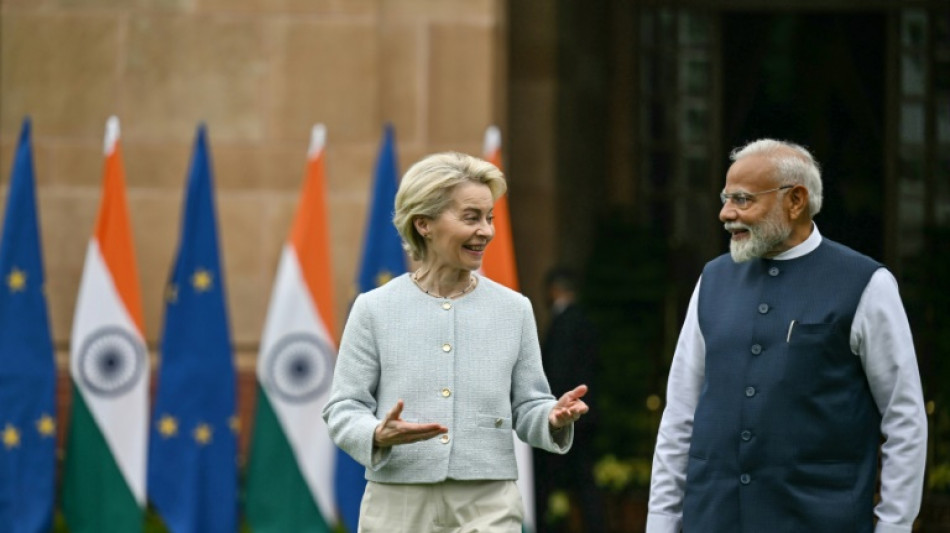
RBGPF
0.0000


India will finalise a "mutually beneficial" free trade deal with the European Union by the end of this year, Prime Minister Narendra Modi said Friday after meeting with EU chief Ursula von der Leyen.
"We have asked our teams to work out a mutually beneficial bilateral free trade agreement by the end of this year," Modi said in New Delhi.
Von der Leyen, who is on a two-day visit to India with her college of commissioners, is seeking to hedge against souring relations with the United States and said they were "expecting a lot from our trade negotiators".
Deeper access to India's rapidly expanding market was at the top of the delegation's agenda, and the EU chief looked visibly pleased after her meeting with Modi and his ministers.
The EU is already India's largest trading partner, accounting for 124 billion euros ($130 billion) worth of trade in goods in 2023 -- more than 12 percent of total Indian trade, according to Brussels.
The Indian market offers many opportunities for sectors ranging from defence to agriculture, cars and clean energy. Yet, protected by high tariffs, it currently accounts for only 2.2 percent of EU trade in goods.
"We have tasked our teams to build on this momentum and finalise our FTA before the end of the year," von der Leyen said in a statement after the meeting.
Standing beside Modi, the EU chief added: "We told them they should surprise us".
The bloc is pushing for a trade deal that lowers entry barriers for its cars, spirits, wines and other products.
India meanwhile hopes for higher EU investments in areas such as clean energy, urban infrastructure and water management.
New Delhi is also pushing for easier mobility for its skilled workforce and higher investments for ventures in India.
Von der Leyen's visit, billed as the first of its kind to the world's fifth-largest economy, comes days after US President Donald Trump announced a slew of tariffs against both friends and foes.
- 'Blueprint' for the future -
The EU also hopes to find common ground with India on their shared concerns over China's growing influence in the Asia-Pacific, building resilient supply chains, and the governance of new technologies including artificial intelligence.
"I can announce that we are exploring a future Security and Defence Partnership with India in the mould of the partnerships we have with Japan and South Korea," von der Leyen said on Friday before meeting Modi.
"This will help us step up our work to counter common threats, whether on cross-border terrorism, maritime security threats, cyber-attacks or the new phenomenon we see: attacks on our critical infrastructure."
New Delhi hopes to gain from coordinated efforts towards building resilient supply chains by wooing businesses looking to move out of China with tax breaks, simplified investment laws, better infrastructure and access to its massive domestic market.
Creating enough jobs for millions of workers in the world's most populous country is one of the biggest challenges for Modi's government.
Von der Leyen and Modi were also expected to discuss Russia's war in Ukraine but the EU chief's statement after the meeting did not directly mention the subject.
India has resisted Western pressure to distance itself from Moscow, its traditional supplier of military hardware, following Russia's invasion of Ukraine.
Indian officials said that the two sides discussed expanding defence exchanges, naval exercises, and cooperating on Indian efforts to diversify and localise its military hardware manufacturing.
India and the EU "have a shared view on peace, security, stability and prosperity" of the Asia-Pacific region, Modi said after the meeting.
This visit "is unprecedented... and we have taken many important decisions on trade, technology, innovation, green growth, security, skilling, and mobility -- a blueprint (for future) has been prepared," he added.
E.Choi--ThChM